12 April 2013
'Bad Science' – Ard Fheis Sketch by Eoin Ó Broin
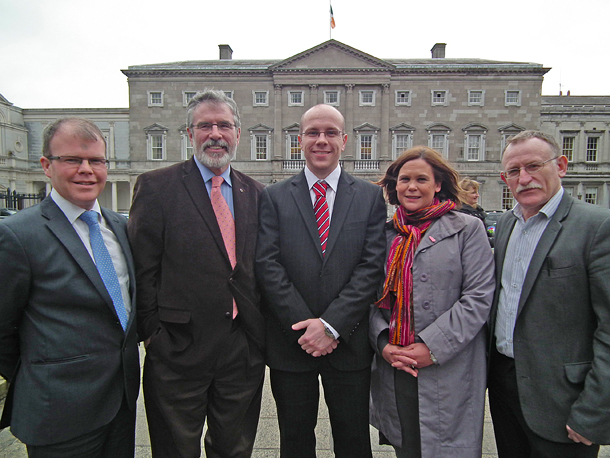
Meath East by-election candidate Darren O'Rourke (centre) with TDs Peadar Tóibín, Gerry Adams, Mary Lou McDonald and Dessie Ellis
Sinn Féin opposes austerity, North and South. We blocked the introduction of water charges in the Executive as we are opposing them in the South. We are actively opposing the Tory Welfare Reform Bill in the Assembly as we are Joan Burton’s welfare ‘reforms’ in the Dáil.
RTÉ TV kicked off their coverage of the Sinn Féin Ard Fheis today with a preview piece on Morning Edition exploring the state of the party in advance of the Castlebar conference.
Micheál Lehane provided a package with interviews from DCU political scientist Jane Suiter and myself.
The package was balanced, offering both complimentary and critical views of the party’s recent development. The general tone was that Sinn Féin is doing well in the Dáil but could do better outside and in elections.
Next up was an in-studio interview in which Keelin Shanley asked DCU political scientist Eoin O’Malley to give his take on the current state of Sinn Féin. At this point things rapidly went downhill.
O’Malley made four main points:
- Sinn Féin did ‘badly’ in the Meath East by-election;
- Gerry Adams is a deeply unpopular political leader in the South and is holding back the party’s growth;
- The party is pursuing different policy agendas North and South; and
- The party’s left wing socio-economic agenda is secondary to its nationalism.
Before responding to each of these claims it is important to stress that O’Malley was on the show as a political scientist. This means that the knowledge he was being asked to impart was of a different order to that of a journalist or political commentator.
Such academic knowledge is meant to be more than just opinion. It makes a claim of superiority based on analysis and expertise. So were O’Malley’s comments an example of academic analysis and expertise or were they just misinformed opinion based on his own political prejudices?
Meath East by-election
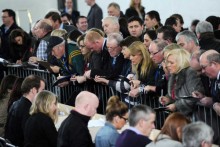 Sinn Féin’s
performance in the Meath East by-election has been described by some as good;
for others it was just okay; but the suggestion that it was bad is hard to
sustain.
Sinn Féin’s
performance in the Meath East by-election has been described by some as good;
for others it was just okay; but the suggestion that it was bad is hard to
sustain.
A bad election is when you lose seats and vote share. Sinn Féin increased its share of the vote by 4% and moved into third place, significantly outpolling Labour.
It would be perfectly legitimate to ask why the party did not do better, particularly given the level of anti-Government feeling amongst the electorate.
Meath East is an historically weak constituency for the party, organisationally and electorally. Darren O’Rourke was a strong but first-time and virtually unknown candidate. The campaign was just three weeks long. Fianna Fáil and Fine Gael had strong brand name candidates with longstanding involvement in the constituency.
Given these factors, 13% for a new candidate in a constituency where Sinn Féin has little presence is pretty positive. Could it have been better? Of course it could. Can you credibly suggest that it was a ‘poor performance’? Hardly.
The Meath East by-election also demonstrates an important reality about Southern Irish politics which any political scientist worth their credentials should know.
To do well in an election you need a strong local organisation and a well-known candidate. High-profile political leaders, strong Dáil performers and public hostility towards the sitting government can create the conditions for electoral growth. But that growth can only be realised if you have the personnel on the ground in the constituency to deliver the votes.
Building a party organisation, constituency by constituency, takes effort and time. Translating this into votes and seats takes even longer. Anyone with even a cursory knowledge of electoral history – and the fate of parties such as Clan na Poblachta, the Workers’ Party or the Progressive Democrats – would know this.
The idea that statewide opinion poll ratings should automatically translate into real votes in a real election in a particular constituency is naive at best. It is certainly not an argument one would expect to hear from a political scientist versed in Irish electoral history.
Gerry Adams
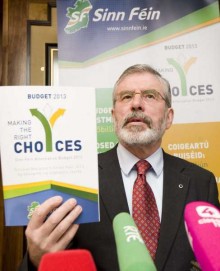 Regardless,
O’Malley argued that it was a bad election for Sinn Féin. When asked why, he
pointed to the ‘unpopularity’ of Gerry Adams.
Regardless,
O’Malley argued that it was a bad election for Sinn Féin. When asked why, he
pointed to the ‘unpopularity’ of Gerry Adams.
Of course, there are many voters who do not like Gerry. But is he really any less popular than the leaders of Fine Gael and Fianna Fáil?
In his first electoral outing in the South during the 2011 general election, Gerry was elected on the first count with an impressive 22% of the vote. His percentage share of the vote compares well with that scored by both Pearse Doherty and Mary Lou McDonald.
In the last three Irish Times Ipsos/MRBI leadership satisfaction polls, Gerry ran close to both Enda Kenny and Mícheál Martin. All three have held the top slot in at least one of the polls and all three have seen their individual score decline.
Party leaders stand down when their parties are doing badly. To the contrary, Sinn Féin is experiencing a period of electoral growth. Whether Sinn Féin would have greater success with another leader is a matter of conjecture. What we do know is that there is no evidence to suggest that the rate of growth is being held back because Gerry is party president.
North and South
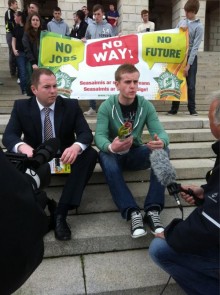 O’Malley’s
views of Sinn Féin’s policy agenda is as poorly-informed as is his reading of
our electoral fortunes. Despite claiming that we are implementing different
agendas North and South, he failed to offer a single example.
O’Malley’s
views of Sinn Féin’s policy agenda is as poorly-informed as is his reading of
our electoral fortunes. Despite claiming that we are implementing different
agendas North and South, he failed to offer a single example.
Sinn Féin opposes austerity and promotes demand-led job growth, socio-economic equality and political reform, North and South. We are actively promoting a Border poll for Irish unity in both jurisdictions.
We blocked the introduction of water charges in the Executive as we are opposing them in the South. We are actively opposing the Tory Welfare Reform Bill in the Assembly as we are Joan Burton’s welfare ‘reforms’ in the Dáil.
And in contrast to the Fine Gael/Labour Government in Dublin, we continue to mobilise the limited powers available to Stormont to limit the negative impact of London’s reduction in the block grant on the poorest in society.
Beyond the economy, our positions on marriage equality, abortion and local government reform – to name three currently in the media – are consistent on both sides of the Border.
The difference between North and South is not Sinn Féin’s policy agenda but the nature of the two institutions, the powers they possess and the political contexts in which they operate.
In the South, even within the Troika programme, the Government has considerable choice available in fiscal and public expenditure policy. In the North, the budget is determined by London, limiting the ability of the Assembly to pursue policy alternatives.
Sinn Féin’s demand for the transfer of full fiscal powers to the Assembly is not only motivated by a desire to reduce London’s influence in Ireland but also to increase the options available to the Assembly in order to pursue an alternative to austerity.
How well Sinn Féin’s manages to pursue a single policy agenda in two different institutional, fiscal and political contexts is an important and legitimate question. But to suggest that we are pursuing two different agendas North and South simply isn’t true.
Liberty, equality and solidarity
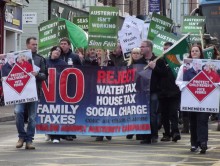 At the core
of Sinn Féin’s political project is a vision of a New Republic in a reunified
island governed through the values of liberty, equality and solidarity.
At the core
of Sinn Féin’s political project is a vision of a New Republic in a reunified
island governed through the values of liberty, equality and solidarity.
Nationalism is a key ideological resource of that project, but it is neither the sole nor the principal source. For O’Malley to suggest that our aspiration for a New Republic is secondary to our desire for national reunification simply demonstrates how little he understands about the aims and objectives of our party.
Of course, everyone is entitled to their opinion. But opinions can be misinformed. When they are, they lose much of their legitimacy.
O’Malley is a professional political scientist. His job is to study and understand the world of politics. When he speaks he does so with an authority that comes with his profession. His views of Sinn Féin as articulated on Morning Edition have little basis in fact. They are an example of what Ben Goldacre would call ‘bad science’. Rather than being based on analysis and expertise they appear to be informed by his middle-class liberalism and his distaste for nationalism.
The real irony is that the kind of Ireland in which I understand Eoin O’Malley would like to live – pluralist, tolerant, democratic and fair – is one more likely to be realised with a Sinn Féin government than with the current or previous administrations, as any delegate at this year’s Ard Fheis would tell you.
Follow us on Facebook
An Phoblacht on Twitter
Uncomfortable Conversations

An initiative for dialogue
for reconciliation
— — — — — — —
Contributions from key figures in the churches, academia and wider civic society as well as senior republican figures





